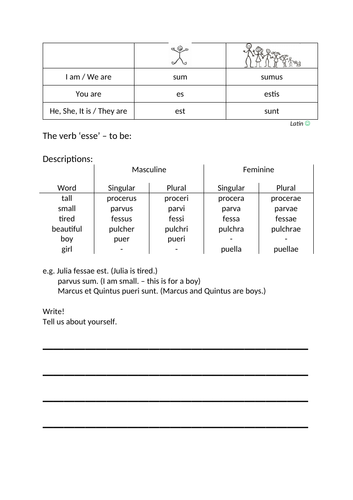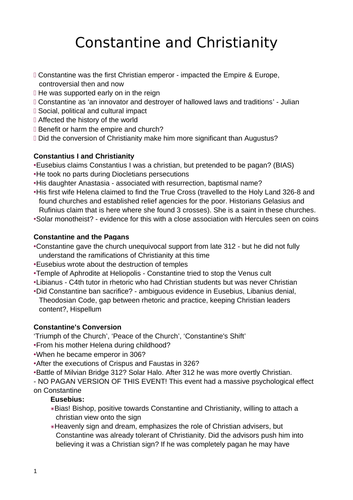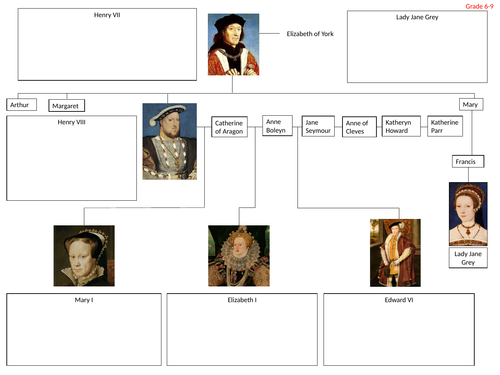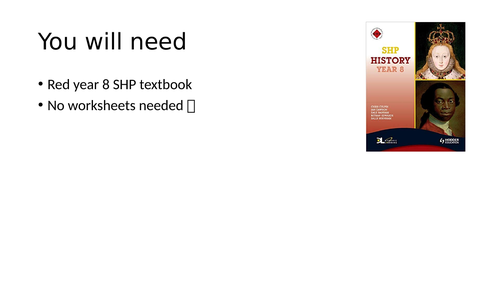338Uploads
118k+Views
41k+Downloads
History

Latin - Esse
For teaching students who are learning Latin for the first time. This worksheet covers ‘esse’.
Worksheet where they can practice writing sentences, includes vocabulary.

Revision Materials for Constantine
For teaching Ancient History.
Notes on Constantine - I have used this as revision for my A Level students and include these at the end of each topic for consolidation.
Includes:
Christianity
Army
Consolidation of power
Rise of power
Key terms and dates
Bundle

Black Death BUNDLE
Whole scheme of work for teaching the Black Death for 11-14s, including assessment! This has been made with a focus on GCSE skills and terminology for Medicine Through Time.
What was the Black Death?
Symptoms/causes
Treatments/preventions
Consequences
Assessment
Also includes a 20 question quiz and knowledge organiser!

GCSE Weimar Republic Revision Questions
For teaching Edexcel GCSE Weimar and Nazi Germany 9-1 new specification.
Quiz questions for all of key topic one (the Weimar Republic) and includes a practice exam question. Useful to set as revision.
Please review if you buy and check out my other lessons and resources!

GCSE Elizabeth - Walter Raleigh and Roanoke/Virginia
For teaching Edexcel GCSE Early Elizabethan England
Whole lesson (2 hours), plus workbooklet to accompany the lesson.
Tasks are differentiated for grades 9-1!
Looks at the importance of Walter Raleigh compared to Francis Drake. Lesson goes through the failed colonies of Roanoke and why attempts to colonise fail. Even includes a 20 question quiz and GCSE exam style homework.

Tudor Family Tree DIFFERENTIATED
This is a Tudor family tree that can be printed A3 and is double sided for differentiation. One side has boxes students can fill in and the other has quiz questions.
Information sheets - also differentiated for LA and HA are included.
I have used this for years and it always goes down really well! I have used this with Year 7s and even Year 13s who are starting their A Level in Tudors. A very versatile resource!

Holocaust: Warsaw Ghetto
For teaching 11-14s Holocaust
This lesson looks at 'What was life like in the Warsaw Ghetto?'
Students will start by looking at what is a ghetto and their locations across occupied Europe. This also includes a timeline of how the ghettos came to be.
Students will then look in depth at the Warsaw Ghetto by watching a series of videos by Yad Visham on YouTube. They will also look at a letter written from Warsaw Ghetto and complete one of three differentiated tasks!
Finally students will write their own letter from the Warsaw Ghetto describing what life was like.
This lesson is differentiated for all students in your class, and includes all resources needed. Minimal resources needed - perfect for even setting as cover!
Feedback is welcome, and please check out my other Holocaust lessons and materials.

GCSE Medicine | 1800's Surgery
For teaching Edexcel 9-1 Medicine Through Time 1250-present.
18th-19th Century Medicine: Why was there a rapid change in surgical treatments c1700-1900?
This lesson covers the problems and solutions of surgery 1700-1900;
The problems in the early 19th century
Pain
Infection
Blood loss
The solutions in the 19th and 20th centuries
Anaesthetics
Antiseptic surgery
Aseptic surgery
Blood transfusions (20th century)
Also included:
Accompanying differentiated work booklet to suit the needs of all students in your class!
20 question quiz plus answers based on the lesson
Role play script!
Exam style question - 12 mark ‘explain why’ + AFL sheet!
Please review if you purchase, and check out my other Medicine Through Time resources!

Hitler Youth Assessment
Suitable for 11-14s.
An assessment that can be done in class or as homework on the Hitler Youth. 3 questions with a GCSE exam style focus; describe two features, a source question and an essay ‘how far do you agree’ question. Includes mark scheme and AFL sheet.
Please review if you buy and check out my other resources.

Rise of Hitler
Can be used as revision for GCSE - this PowerPoint goes through the Rise of Hitler, including some video clips.
I usually get students to make a mind-map of the information.

Democracy and Dictatorship
Suitable for teaching 11-16s.
This lesson looks at the difference between democracy and dictatorship and can be used as a starter lesson for introducing Nazi Germany or the Cold War.
The lesson includes activities such as sorting political parties on a spectrum and understanding countries that are a democracy/dictatorship today.
Please review if you buy and check out my other resources.

Henry VII Rebellions 20Q quiz
Questions are based on rebellions for the OCR Tudor Rebellions course.
20 question quiz on Henry VII. I use this for A Level but can be used with any age group. Includes answers.

Royal Power & Charles I
Suitable for teaching KS3.
The story of royal power from 1500-present day. This lesson looks at how and why royal power changed from 1500-present day, creating a ‘royal rollercoaster’ by looking at the stories of different monarchs. This is a great introductory lesson for Charles I and the Civil War, as it encourages students to consider what the turning point might be in royal power.
It would be useful to have access to the Year 8 SHP textbooks for this lesson.
Please check out my other resources, and review if you purchase!

Assassination of Franz Ferdinand
Suitable for teaching 11-14s on WW1 - Assassination of Franz Ferdinand.
Whole lesson plus resources on the assassination of Franz Ferdinand. Students investigate the assassination by using a ‘Sarajevo Police Report’ using a video and differentiated information sheets. Plenary gets students to decide who they think is to blame for the assassination.
Please review if you purchase and check out my other resources.

WW1 Medicine: Trenches & Ambulances
For teaching Edexcel GCSE 9-1 Medicine Through Time - the British Sector on the Western Front
Whole lesson plus work booklet for teaching grades 9-1 with differentiated tasks: ‘How did the organisation of the trench system affect medical treatment?’
This lesson looks at:
Trench system
Stretcher bearers including source analysis
Ambulances (motor, horse, canal, barge, ship and train)
Also include an exam style question WITH SOURCES:
How useful are sources A and B for an enquiry into the problems faced by stretcher bearers? (8 marks) & Describe two features of transportation of injured soldiers on the Western Front (4 marks)
ALSO included - 20 question quiz!
You will need access to the Pearson textbook
Please review if you purchase and check out my other WW1 Medicine lessons and resources.

GCSE Germany | Munich Putsch
For teaching Edexcel GCSE 9-1 Weimar and Nazi Germany 1918-1939
The Early Years of the Nazi Party
Why did the Munich Putsch fail?
Students will look at the causes, events and consequences of the Munich Putsch.
Also included:
Accompanying work booklet to the lesson, with a wide range of fun activities!
20 question quiz plus answers based on the lesson
An 8 mark ‘how useful’ source question with AfL sheet
Please review if you purchase, and check out my other Weimar and Nazi Germany resources.

Battle of Britain
For teaching 11-14s
Why did Britain win the Battle of Britain?
This lesson looks at why Britain won the Battle of Britain. Students begin by understanding the context after Dunkirk and Hitler’s plan (including 2 videos!), then looking at which side was better prepared.
Then students will use differentiated sources (included) to assess why Britain won the Battle of Britain.
Please note 20th Century World textbooks by SHP are needed for 1 task (the which side was better prepared) but the rest of the lesson is fully resourced!
Feedback is welcome; please review if you purchase!
Bundle

GCSE Germany | Weimar Republic BUNDLE
For teaching Edexcel GCSE 9-1 Weimar and Nazi Germany 1918-1939
Key Topic 1: Weimar Republic
BUNDLE of 6 lessons;
Origins of the Weimar Republic
Treaty of Versailles
Spartacists and Kapp Putsch
Ruhr Crisis and Hyperinflation
Recovery of the Weimar Republic
Golden Age
Also included:
Revision lesson plus exam paper
Revision questions
Knowledge quiz
Each lesson comes with an accompanying work booklet. Each lesson includes exam questions, including sources and interpretations!

Dunkirk Evacuation
For teaching 11-14s the Dunkirk Evacuation.
Why was Dunkirk in 1940 a triumph for the Allies?
This lesson looks at;
What happened at Dunkirk?
Was Dunkirk a triumph or a defeat? - This is done by looking at film clips from Dunkirk!
Why was Dunkirk portrayed as a victory? - Students look at newspaper headings from the time
How did the news and people ‘portray’ the events at Dunkirk? You need access to the 20th Century World textbooks by SHP for this task.
Please review if purchase, all feedback is welcome. Check out my other WW2 and KS3 lessons and resources.

OCR Pilgrimage of Grace depth study CAUSES
For teaching OCR A Level Rebellion and Disorder under the Tudors 1485-1603
This is lesson 1 of the depth study for the Pilgrimage of Grace. This two hour lesson focuses on the causes of the Pilgrimage of Grace.
This lesson looks at;
Political, economic and religious causes of the rebellion
Regional variations in the rebellion (Lincolnshire, Yorkshire and Cumberland) to ascertain if each rebellion had different causes
Why did the closure of monasteries have a major impact on Northern Society
Leaders of the Pilgrimage of Grace - did each leader have their own objective? To what extent can we understand causes of the rebellion by looking at each leader?
Was PoG religious or secular? - Looking at different historians views and coming to our own conclusions
Overall students will decide what the most important cause of the Pilgrimage of Grace was.
Feedback is welcome, please review if you purchase!




















